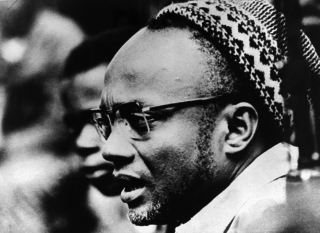| |||||
| Decades: | |||||
|---|---|---|---|---|---|
| See also: | Other events of 1981 Timeline of Cabo Verdean history | ||||
The following lists events that happened during 1981 in Cape Verde .
| |||||
| Decades: | |||||
|---|---|---|---|---|---|
| See also: | Other events of 1981 Timeline of Cabo Verdean history | ||||
The following lists events that happened during 1981 in Cape Verde .

Politics of Cape Verde takes place in a framework of a semi-presidential representative democratic republic, whereby the Prime Minister of Cape Verde is the head of government and the President of the Republic of Cape Verde is the head of state, and of a multi-party system. Executive power is exercised by the president and the government. Legislative power is vested in both the government and the National Assembly. The judiciary is independent of the executive and the legislature. The constitution, first approved in 1980 and substantially revised in 1992, forms the basis of government organization. It declares that the government is the "organ that defines, leads, and executes the general internal and external policy of the country" and is responsible to the National Assembly.

The recorded history of Cape Verde begins with the Portuguese invasion and colonization of the island in 1458. Possible early references to Cape Verde date back at least 2,000 years.
"Esta É a Nossa Pátria Bem Amada" is the national anthem of Guinea-Bissau. Written in 1963 by Amílcar Cabral (1924–1973) and composed by Xiao He (1918–2010), it was adopted upon independence from Portugal in 1974.

Aristides Maria Pereira was a Cape Verdean politician. He was the first President of Cape Verde, serving from 1975 to 1991.

Pedro de Verona Rodrigues Pires is a Cape Verdean politician who served as Prime Minister of Cape Verde from 1975 to 1991, and later as President from 2001 to 2011.

José Maria Pereira Neves is a Cape Verdean politician who is currently the president of Cape Verde, having previously served as the Prime Minister of Cape Verde from 2001 to 2016. He is a member of the African Party for the Independence of Cape Verde (PAICV). In the 2021 presidential election, he was elected with 51.7% of votes, beating his nearest rival Carlos Veiga who got 42.4% of the total votes.

The national flag of Cape Verde was adopted on 22 September 1992, replacing the flag adopted during Cape Verdean independence, fought for with Guinea-Bissau, another former Portuguese colony on mainland West Africa.

The national flag of Guinea-Bissau was adopted in 1973 when independence from Portugal was proclaimed.

Amílcar Lopes Cabral was a Bissau-Guinean and Cape Verdean agricultural engineer, political organizer, and diplomat. He was one of Africa's foremost anti-colonial leaders. He was also a pan-Africanist and intellectual nationalist revolutionary poet.

The African Party of Independence of Cape Verde is a democratic socialist political party in Cape Verde. It was formerly a Marxist–Leninist communist party and the sole legal party in the country from 1981 to 1990. Its members are nicknamed "os tambarinas" in Portuguese, and they identify themselves with the color yellow.

Carlos Alberto Wahnon de Carvalho Veiga is a Cape Verdean politician. He was Prime Minister of Cape Verde from April 4, 1991, to July 29, 2000.

The National Assembly is the unicameral legislative body of the Republic of Cabo Verde.

Cape Verde or Cabo Verde, officially the Republic of Cabo Verde, is an archipelago and island country of West Africa in the central Atlantic Ocean, consisting of ten volcanic islands with a combined land area of about 4,033 square kilometres (1,557 sq mi). These islands lie between 600 and 850 kilometres west of Cap-Vert, the westernmost point of continental Africa. The Cape Verde islands form part of the Macaronesia ecoregion, along with the Azores, the Canary Islands, Madeira and the Savage Isles.

Cape Verde was a colony of the Portuguese Empire from the initial settlement of the Cape Verde Islands in 1462 until the independence of Cape Verde in 1975.

Cape Verde–Guinea Bissau relations refers to the bilateral relationship between the Republic of Cape Verde and the Republic of Guinea-Bissau. Cape Verde is an island country about 900 km north-west of Guinea-Bissau, a coastal West African country. Both were colonies of the Portuguese Empire and they campaigned together for independence with a plan for unification, but the countries separated after 1980. The two countries were both founder members of the Community of Portuguese Language Countries (CPLP) in 1996, and are each members of the African Union and the Economic Community of West African States (ECOWAS).
The Military ranks of Guinea-Bissau are the military insignia used by the Military of Guinea-Bissau.

Cape Verde–Portugal relations are the diplomatic relations between the Republic of Cabo Verde and the Portuguese Republic. Both nations are members of the Community of Portuguese Language Countries and the United Nations.

Cape Verde–Yugoslavia relations were the historical foreign relations between Cape Verde and Yugoslavia. The two countries established formal relations in 1975, though Yugoslav assistance to Cabo Verdean leadership predates the nation's independence from Portugal.